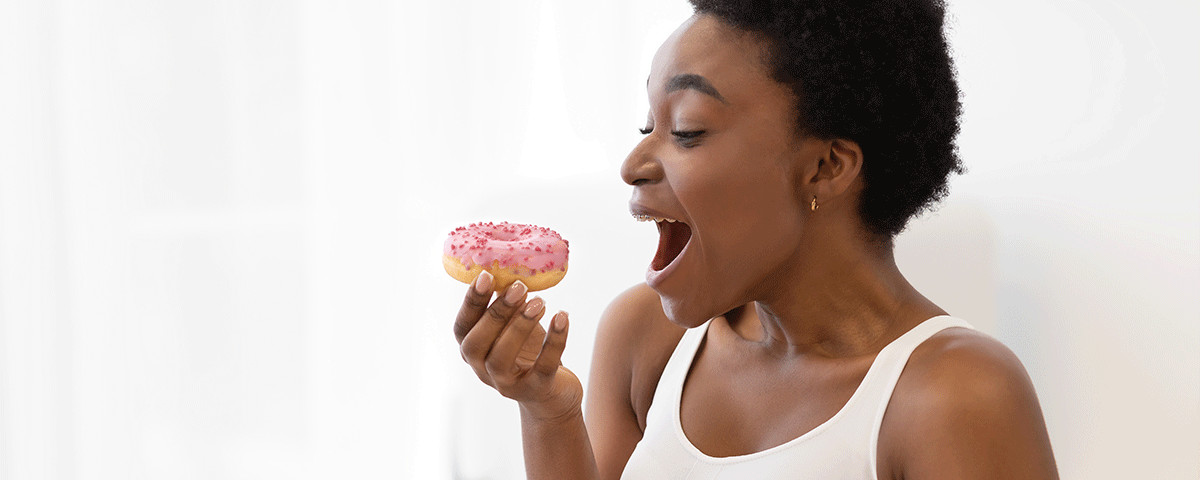Did you experience sugar cravings when you quit drinking? If so, you aren’t alone.
There seems to be a distinct link between addiction and sugar cravings that many addicts experience in recovery. If you’re a recovering alcoholic, you may have expected some discomfort and other challenges, but not this. This type of craving is a new one, and you can’t seem to shake it. You may be thinking, “Oh great. I stopped drinking alcohol, and now I crave sweets. What now?” Now that you’ve made the brave decision to quit drinking, you’re being plagued by sugar cravings. But why? Our drug rehab in Philadelphia looks into why people get sugar cravings after quitting alcohol.
Are Alcoholism and Sugar Addiction Related?
Yes, alcoholism and sugar addiction are related. But how? According to a study conducted on sugar addiction, eating sweets has the same effect on your brain as drugs do.1 Consuming sugar can activate neurotransmitters like dopamine and serotonin in the brain, both of which play roles in controlling mood, pleasure, and the reward pathway in the central nervous system. Over time, a person can become so desensitized to the pleasure of sugar that they may increase their intake and even experience intense cravings for it. Sugar addiction is a real thing and works similarly to alcoholism.
But what does that have to do with sugar cravings after quitting drinking? Well, craving sugar after stopping alcohol is the result of a whole culmination of reasons. While most people attribute their post-drinking sugar cravings to their body’s reaction to the reduced intake of sugar that’s usually found in alcoholic drinks, this isn’t a complete explanation.
Why Do Alcoholics Crave Sugar?
Why people get sugar cravings after quitting alcohol can be attributed to three main reasons: sugar is addictive, low blood sugar, and addiction replacement.
Sugar Can Be Addictive, Too
As with many things, craving sugar after drinking alcohol starts in the brain. After you quit drinking, your brain and body are aware that they can experience a similar high or intoxication with sugar. In fact, according to a study on quitting alcohol and sugar cravings, the effects of sugar on neurological pathways in the brain are similar to those of other substances of abuse. Specifically, sugar can affect the hedonic regions of the brain, which impact the sensory rewards, such as a “liking” for sweet things. The study also found that sugar cravings can be hereditary, and children of alcoholic parents are more likely to have a strong preference for sugar.2
Additionally, using any habit-forming substance can:
- Activate the brain’s reward system
- Release dopamine
- Promote the desire for further use of the substance
- Require the brain to encourage greater consumption
- Gradually desensitize the body to the effects of a certain dose, so more has to be taken (tolerance)
Alcohol and Low Blood Sugar
Long-term alcohol abuse inhibits the body’s ability to regulate blood sugar levels. This is partially a result of alcohol’s effects on the pancreas, which is primarily responsible for blood sugar levels. Poor diet and malnutrition, two common traits among long-term addicts, can also affect blood sugar. Many heavy drinkers are hypoglycemic or have low blood sugar, which can cause sugar cravings. This becomes a more serious concern when alcohol is taken out of the picture.
Replacing One Addiction With Another
Experiencing sugar cravings when stopping alcohol can occur when a person replaces one addiction with another, also known as transfer addiction. While relying on sweets to keep you sober in the early stages of recovery can be beneficial, becoming dependent on sugar to stay sober is a whole other problem. Not only does sugar’s long-term effects on the body – like cardiovascular disease and type 2 diabetes – pose a problem, but the goal of sobriety is to not be reliant on any substance. If you’re prone to addictive behaviors, then you may be more likely to turn to other alternatives, such as sugar, to stay sober.
Substance abuse of any kind can significantly impact a person’s health, relationships, career, and overall well-being. If you or a loved one is in need of drug or alcoholism treatment, we can help. Call Banyan Philadelphia today at 888-280-4763 to learn more about the drug treatment programs we offer.
Source:
- NCBI - Evidence for sugar addiction: Behavioral and neurochemical effects of intermittent, excessive sugar intake
- Taylor & Francis Online - Sweet Preference, Sugar Addiction and the Familial History of Alcohol Dependence: Shared Neural Pathways and Genes
Related Readings:









